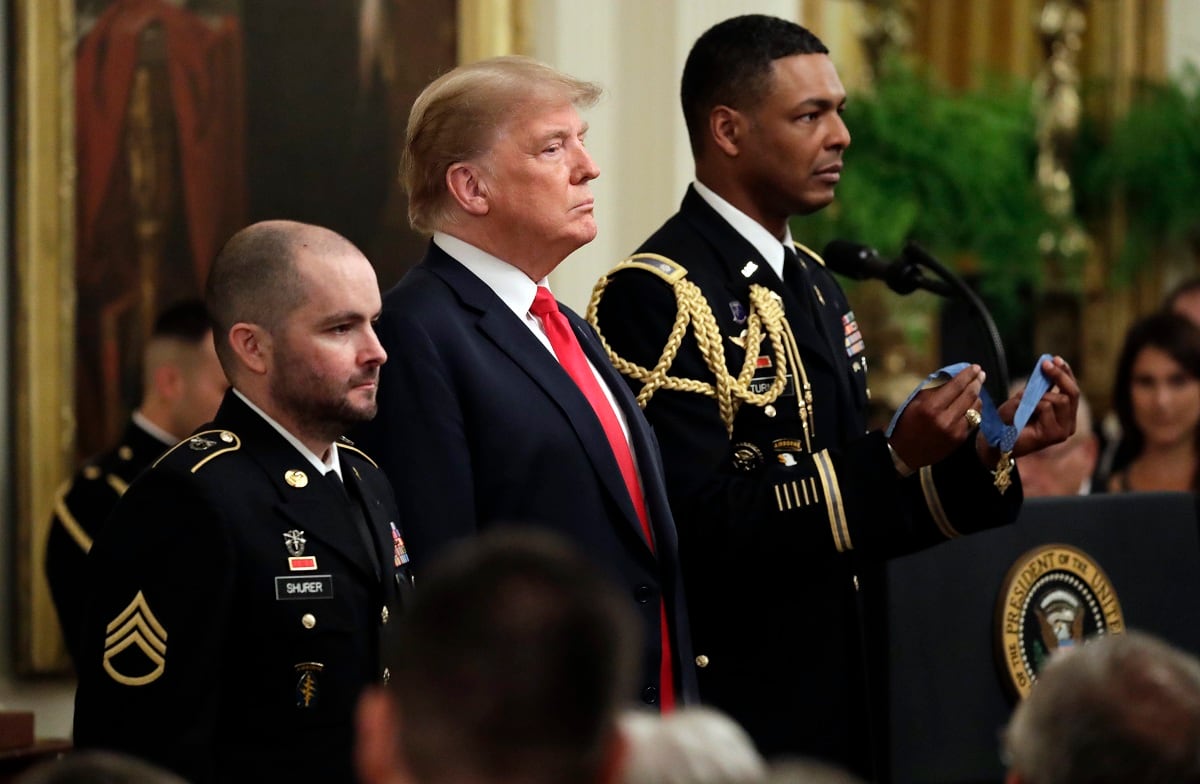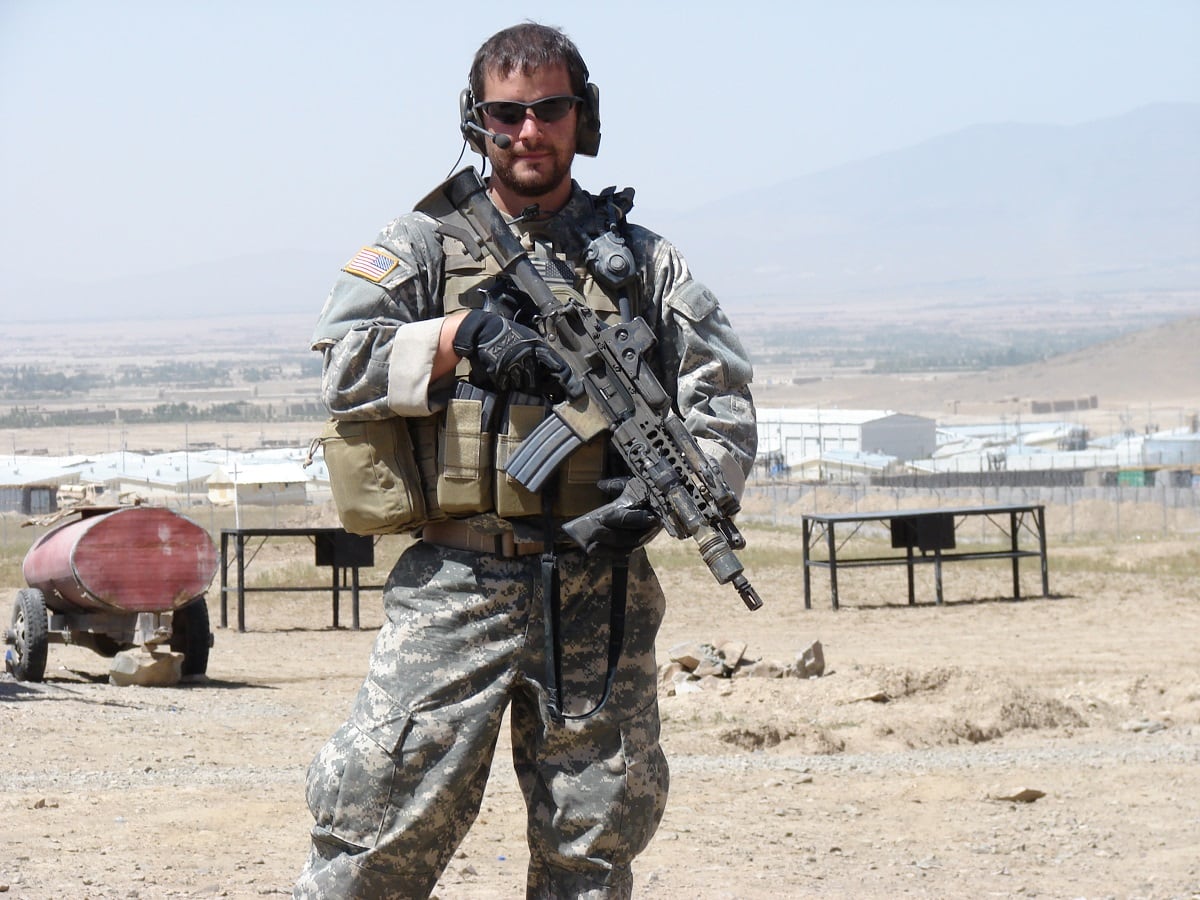A decade ago, former Staff Sgt. Ronald Shurer II earned a Silver Star for his actions as a medic with 3rd Special Forces Group in Afghanistan. By the following year, he had left the Army and joined the Secret Service, where he’s worked ever since.
He never heard a thing about a possible upgrade of that award, until President Donald Trump told him as much on Sept. 4, he told Army Times on Sunday.
“I never heard a rumor,” he said. "For several weeks prior to that I had several cryptic calls from the military saying, ‘We need to set up a call between you and a high-ranking DoD official.' "
On Monday, he received his award in a White House ceremony, joined by his wife, two sons, fellow members of Operational Detachment-Alpha 3336, two of their Afghan interpreters and five recent Medal of Honor recipients.
“Today he joins the world’s most elite gathering of heroes,” Trump said during the ceremony.
Last year, Shurer was diagnosed with stage 4 lung cancer.
“He is a warrior,” Trump said.
Medal of Honor recipients are officially notified by the president, but in practice, many of them have a heads up, either because their upgrade is part of a civilian campaign to review the original award, or because they are still serving and communicating with the chain of command who recommended them in the first place.
That first scenario was the case for former Spc. Jim McCloughan and retired Capt. Mike Rose, who saw their Vietnam-era awards reborn as Medals of Honor over the past year.
However, in recent years, the entire Defense Department has undertaken a valor medal review, bumping up lower awards like Silver Stars and Distinguished Service Crosses. Shurer’s case was under wraps the entire time, he said.
“Because I’m in the Secret Service, they coordinated switching the notification from a phone call to going and meeting him in the Oval [Office],” he said.
They set up “a little bit of a ruse," he added, so he thought he was going to the White House for a work-related meeting. When he showed up, the president informed him he’d be receiving the military’s highest valor award.
“Everybody asked me what he said. I don’t know,” Shurer said. “He said that and everything just went to trying to process what he had just said.”

Shurer, 39, will be the third living soldier to receive the Medal of Honor in the past two years. All three have been medics, and two have been Green Berets.
“It’s odd to try to consider myself with those guys," he said. “My wife tries to keep reminding me. I have to remember how I thought of Medals of Honor on Sept. 3, before I was told.”
The military has been working its way through 1,300 valor awards given out since 9/11 in an effort to re-examine whether the actions that earned them deserve higher recognition.
“I’m definitely glad that other awards are being looked at and recognized,” Shurer said. “I think that’s a good thing, that the country can re-evaluate, and not just say, ‘Hey, we made that call once. It’s set.’ It’s humble enough to say, we can do a little better for that soldier, sailor, airman, whoever.”
Shurer was born on the anniversary of D-Day, he said, and grew up just down the road from Joint Base Lewis-McChord in Puyallup, Washington. His parents were in the Air Force, his grandfather was a World War II veteran and his great grandfather was a World War I veteran, but he didn’t feel the call to join up until after 9/11, when he was just beginning a master’s degree program at Washington State University.
He enlisted in 2002 and spent six months in a Fort Bragg, North Carolina, medical battalion before his number was called for Special Forces selection, he told Army Times. He reported to 3rd Group in 2006.
RELATED

The Battle of Shok Valley, on April 6, 2008, fell squarely during his second seven-month deployment, he said.
ODA 3336 was on a mission to capture a high-value insurgent target based in a mountainside compound. To get to him, they’d have to leap from a helicopter onto the banks of a freezing river, then hike up a nearly vertical 60-foot hill.
They were quickly spotted. In the ensuing six-hour firefight, their interpreter was killed, though Shurer managed to triage and save more than a dozen of his teammates and their Afghan partners.
“Not a single American died in that brutal battle, thanks in great measure to Ron’s heroic actions,” Trump said.
Meghann Myers is the Pentagon bureau chief at Military Times. She covers operations, policy, personnel, leadership and other issues affecting service members.



